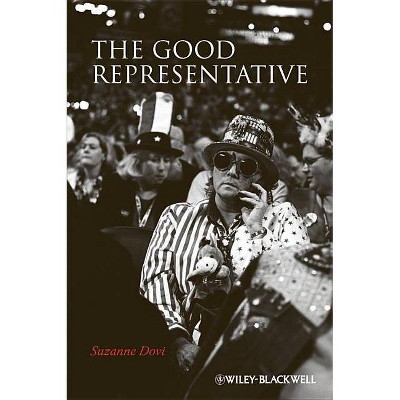The Good Representative - (New Directions in Ethics) by Suzanne Dovi (Paperback)

Similar Products
Products of same category from the store
AllProduct info
<p/><br></br><p><b> Book Synopsis </b></p></br></br>In <i>The Good Representative</i>, Suzanne Dovi argues that democratic citizens should assess their representatives by their display of three virtues: they must be fair-minded, build critical trust, and be good gatekeepers. <ul> <li>This important book provides standards for evaluating the democratic credentials of representatives.</li> <li>Identifies the problems with and obstacles to good democratic representation.</li> <li>Argues that democratic representation, even good democratic representation, is not always desirable.</li> <li>Timely and original, this book rejects the tendency to equate respect for the preferences of citizens with neutrality on the standards used in choosing their representatives.</li> </ul><p/><br></br><p><b> From the Back Cover </b></p></br></br>Is President George W. Bush, by democratic standards, a good or a bad representative? Who is a better representative according to democratic standards: former Rep. Tom DeLay or Senator Hillary Clinton? Political theorists typically remain silent about the proper standards that democratic citizens should use for selecting their representatives. In <i>The Good Representative</i>, Suzanne Dovi argues that democratic citizens should evaluate their representatives using democratic criteria. In doing so, she provides an account of what it means to represent in a democratic fashion as well as a framework within which citizens can assess the democratic credentials of their representatives. For Dovi, good democratic representatives manifest three virtues: they must be fair-minded, build critical trust, and be good gatekeepers. <br /> <p>Arguing that democratic representation, even good democratic representation, is not always desirable, Dovi also prompts us to think about how democratic representation can be a tool of liberation or a tool of domination.</p> <p>This timely and provocative book articulates, for the first time, a normative framework within which democratic citizens can fruitfully proceed in assessing their representatives as democratic representatives.</p><p/><br></br><p><b> About the Author </b></p></br></br><b>Suzanne Dovi</b> is an Assistant Professor of Political Science and Philosophy at the University of Arizona. Her research interests include democratic theory, representation (especially the representation of historically disadvantaged groups), feminist theory, and normative concepts such as hypocrisy, guilt, and despair. Her work has appeared in <i>American Political Science Review</i>, <i>Constellations</i>, <i>Journal of Politics</i>, and <i>Polity</i>.
Price History
Price Archive shows prices from various stores, lets you see history and find the cheapest. There is no actual sale on the website. For all support, inquiry and suggestion messagescommunication@pricearchive.us




















